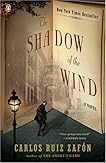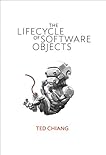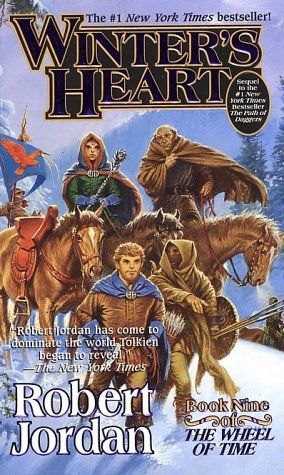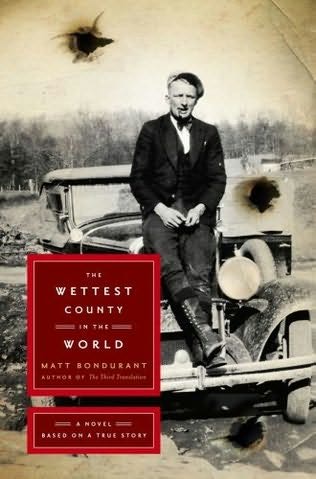You are using an out of date browser. It may not display this or other websites correctly.
You should upgrade or use an alternative browser.
You should upgrade or use an alternative browser.
What are you reading (April 2011)
- Thread starter Maklershed
- Start date
sparky2112 said:Same thing that Oscar Wao winning it meant. A very good book, no doubt, but king of the hill for the entire year?!? For that matter, I just read Olive Kitteridge (had to - my friend is now friends with the author) and that too was, while very good, a little like...huh?
I'm not sure what you mean by Oscar Wao. That book was quite good. I don't mind it being king of the hill for a year.
Finished 'The Lies of Locke Lamora" recently, and am starting "Red Seas over Red Skies", and am really bummed out sofar as...
The lame bondsmage is back in some way, as I just reached the part where locke and jean are confronted in the market by a bunch of possessed merchants. Easily the worst part of the first book, no logic to the bondsmage concept whatsoever and it really killed the flow of the book. Seeing lame nonsensical magic in this otherwise interesting world was a bummer in the first book and it sucks that it'll be in this one as well
X26 said:Finished 'The Lies of Locke Lamora" recently, and am starting "Red Seas over Red Skies", and am really bummed out sofar as...
Book gets good. Which is not to say that it isn't all very silly.
Very hyped for the third. Hope Lynch can kick the depression.
nakedsushi
Member
Guileless said:2011 Pulitzers were just announced. Anyone read any of these? I remember somebody posting that they were reading the Washington biography.
FICTION - "A Visit from the Goon Squad" by Jennifer Egan (Alfred A. Knopf)
DRAMA - "Clybourne Park" by Bruce Norris
HISTORY - "The Fiery Trial: Abraham Lincoln and American Slavery" by Eric Foner (W. W. Norton & Company)
BIOGRAPHY - "Washington: A Life" by Ron Chernow (The Penguin Press)
POETRY - "The Best of It: New and Selected Poems" by Kay Ryan (Grove Press)
GENERAL NONFICTION - "The Emperor of All Maladies: A Biography of Cancer" by Siddhartha Mukherjee (Scribner)
I read the Egan book and liked it a lot. I wouldn't call it life-changing but it was engaging and very, very well written. Her transitions between past, present, and different frames are so smooth and seamless. She has some very clever turn of phrases.
nakedsushi
Member
Oh yah, I finished reading this early this week but forgot to post about it:

Bossypants by Tina Fey
It got lots of chuckles out of me. As a whole, it's a little disjointed and not a continuous narrative, but definitely some good comedy writing in it.
I'm freaked out by the man-arms on the cover.

Bossypants by Tina Fey
It got lots of chuckles out of me. As a whole, it's a little disjointed and not a continuous narrative, but definitely some good comedy writing in it.
I'm freaked out by the man-arms on the cover.
HiroProtagonist
Member
Some NKOTB bumped a thread from 2009, and I stupidly posted in that one. Errrr.
Last month I got the last Malazan book - The Crippled God. Started reading it, and got to the Ganoes section and realized I didn't know where he was - continent or city. So, I decided to go back and re-read Toll the Hounds and Dust of Dreams. Toll the Hounds was still a chore, but Dust was much better the second time. I thought that The Crippled God was a great final book in an huge (three and a half million words- per the acknowledgements section) series.

Toll the Hounds by Steven Erikson

Dust of Dreams by Steven Erikson

The Crippled God by Steven Erikson
I'm 17% in to The Dragon's Path, and I'm finding the political intrigue less than intriguing.

The Dragon's Path by Daniel Abraham
Yesterday I bought Bossypants by Tina Fey. I finished it today, and thought it was funny, Self-deprecating, and sarcastic. Basically, all things I enjoy. I was expecting something in the vein of David Sedaris, but this is definitely written in her voice, and is not an attempt to ape anyone else's style.

Bossypants by Tina Fey
Last month I got the last Malazan book - The Crippled God. Started reading it, and got to the Ganoes section and realized I didn't know where he was - continent or city. So, I decided to go back and re-read Toll the Hounds and Dust of Dreams. Toll the Hounds was still a chore, but Dust was much better the second time. I thought that The Crippled God was a great final book in an huge (three and a half million words- per the acknowledgements section) series.

Toll the Hounds by Steven Erikson

Dust of Dreams by Steven Erikson

The Crippled God by Steven Erikson
I'm 17% in to The Dragon's Path, and I'm finding the political intrigue less than intriguing.

The Dragon's Path by Daniel Abraham
Yesterday I bought Bossypants by Tina Fey. I finished it today, and thought it was funny, Self-deprecating, and sarcastic. Basically, all things I enjoy. I was expecting something in the vein of David Sedaris, but this is definitely written in her voice, and is not an attempt to ape anyone else's style.

Bossypants by Tina Fey
Tim the Wiz
Banned
Cyan said::/
I'd really like some non-fiction or more challenging fiction.
Is that an executive decision?
Recently I've read Ibsen's poems and written an analysis of Hawthorne's "Young Goodman Brown". The poems were, frankly, boring - his plays are much more interesting. YGB is an absolutely brilliant short story, and can be interpreted in an endless number of ways. You can read it here: http://www.online-literature.com/hawthorne/158/
About to start Thomas Mann's "Buddenbrooks". I've read two of his other books, "The Magic Mountain" and "Doctor Faustus", and both are great if you like philosophical novels. Buddenbrooks seems to be lighter on the philosophy. We'll see.
About to start Thomas Mann's "Buddenbrooks". I've read two of his other books, "The Magic Mountain" and "Doctor Faustus", and both are great if you like philosophical novels. Buddenbrooks seems to be lighter on the philosophy. We'll see.
Psh, bunch of haters here, at least two other people liked it.Tim the Wiz said:Is that an executive decision?Stover puts Pressfield to shame, at the very least.
Those arms do look... uh, mannish. She looks bigger in general.nakedsushi said:It got lots of chuckles out of me. As a whole, it's a little disjointed and not a continuous narrative, but definitely some good comedy writing in it.
I'm freaked out by the man-arms on the cover.
Snowman Prophet of Doom
Member
Cyan said:Finished up the April book club book, The Afghan Campaign.
Final verdict: not bad, exactly, but kinda meh. 2.5/5.
Hopefully we can come up with a good read for next month's club selection. Something we can sink our teeth into and have some good discussions.
Can we read A Tree Grows in Brooklyn? I've only read a part of it, but from what I can tell, it's an underrated (and under-read) American masterpiece.
Snowman Prophet of Doom
Member
Guileless said:2011 Pulitzers were just announced. Anyone read any of these? I remember somebody posting that they were reading the Washington biography.
FICTION - "A Visit from the Goon Squad" by Jennifer Egan (Alfred A. Knopf)
DRAMA - "Clybourne Park" by Bruce Norris
HISTORY - "The Fiery Trial: Abraham Lincoln and American Slavery" by Eric Foner (W. W. Norton & Company)
BIOGRAPHY - "Washington: A Life" by Ron Chernow (The Penguin Press)
POETRY - "The Best of It: New and Selected Poems" by Kay Ryan (Grove Press)
GENERAL NONFICTION - "The Emperor of All Maladies: A Biography of Cancer" by Siddhartha Mukherjee (Scribner)
http://www.amazon.com/dp/080211914X/?tag=neogaf0e-20
You can read a few excerpts from the poetry winner. Very unimpressive and generic stuff, with a number of rather poor enjambments, to boot.
HiroProtagonist
Member
Dresden said:Psh, bunch of haters here, at least two other people liked it.
Those arms do look... uh, mannish. She looks bigger in general.
Those aren't her arms. It's a wacky comedy cover. :|
Burger
Member
Kraftwerk said:Page 150, and It's getting hard to read further. I'm still going to soldier on 50 more pages. God I hope it gets better ;__;
I've enjoyed many of Banks' novels, but christ, that one is a chore. I've tried to read it twice, and given up both times. It's so abstract and boring.
Cyan said:I'll add it to the list.
I would suggest Rouse Up O Young Men of the New Age by Kenzaburo Oe, but Amazon (what a sham of a company) appear to be running out of copies.
Anodyne Publisher's Weekly blurb:
Writing once again with depth and passion about his relationship with his brain-damaged son, the Nobel laureate transforms his musings into a full-blown narrative that becomes a thoughtful yet provocative study of the nature of human relationships, filtered through the author's fascination with the writings of William Blake. The story starts in familiar territory as the narrator, "K," replays the heartbreaking realization that "Eeyore" has a bizarre form of brain damage that may actually be a malformed second brain. He grapples with his son's disturbing behavior, delving into such basic human concepts as death and suicide. K also deals with the reaction of the readers of his fiction in several passages, most notably that of a student who kidnaps Eeyore and leaves him at a Tokyo train station because he disapproves of the author's political stances. K's overall family life is left largely untouched until the end, with the author choosing instead to allude to his son's experiences through references to Blake's works, which become the subtext as Eeyore finally begins to compose and perform music and then to claim his real name and identity. This is a deceptively modest, powerful book by a master at the height of his literary powers. Whether he's expanding on a mystical or philosophical concept or painting an achingly poignant picture of a unique father-and-son relationship, Oe contrives intensely memorable images of these two special characters and their thoughts, insights and loves that will stay with readers.
Mumei said:I'm reading the John Rutherford translation.
You've gone and made Tobias Smollett mad.
Salazar said:You've gone and made Tobias Smollett mad.
Heh.
Sorry, I got the Penguin Classic book a few years back. I'm happy with it.
HiroProtagonist
Member
Salazar said:You've gone and made Tobias Smollett mad.
I read the Grossman translation. Where does that rank?
nakedsushi
Member
Finished this in the tub:

Scoundrel by Zoe Archer
Pretty trashy, but that was perfect for what I was craving. I sped-read through the last third because I was tired of the main character. She was too obsessed with trying to be treated as an equal (because of her gender) but still allowed men to carry her around. I liked the first book in the series better.

Scoundrel by Zoe Archer
Pretty trashy, but that was perfect for what I was craving. I sped-read through the last third because I was tired of the main character. She was too obsessed with trying to be treated as an equal (because of her gender) but still allowed men to carry her around. I liked the first book in the series better.
Finished this finally:

It was a good read. Pretty easy to understand and some great concepts to take in for anyone not learned on the finer details of evolution, particularly about the argument against group selection which seems like common sense until Dawkins comes along and trashes it! The only issue I had with it was that he'd sometimes posit and idea and then just suggest some 'possible' explanation for it and act like this was sufficient for proof to continue on with the rest of his argument. I realize that much of what he suggests is very plausible and likely right, but it still bothers me a little bit. Otherwise, I'm glad I read it.
So yesterday, I went to Barnes and Noble and decided to jump on the hype train for a couple of series. I bought Hyperion by Dan Simmons and I got the first book in the Song of Ice and Fire series(Game of Thrones for those out of the loop!). Considering I dont have HBO, I figured I might find out what the fuss is all about.
I'm taking the suggestion that only the first two Hyperion books are worth reading, so I've started that book first since its a shorter series than the other. So far, I'm hooked. Its clearly head and shoulders above most sci-fi stuff, whether books or movies or TV or whatever. Well-written and well thought-out, fleshed out characters and a permanent sense of intrigue about 'what happens next' have made me a fan and I'm only 180 pages in. You guys didn't disappoint! Thanks.

It was a good read. Pretty easy to understand and some great concepts to take in for anyone not learned on the finer details of evolution, particularly about the argument against group selection which seems like common sense until Dawkins comes along and trashes it! The only issue I had with it was that he'd sometimes posit and idea and then just suggest some 'possible' explanation for it and act like this was sufficient for proof to continue on with the rest of his argument. I realize that much of what he suggests is very plausible and likely right, but it still bothers me a little bit. Otherwise, I'm glad I read it.
So yesterday, I went to Barnes and Noble and decided to jump on the hype train for a couple of series. I bought Hyperion by Dan Simmons and I got the first book in the Song of Ice and Fire series(Game of Thrones for those out of the loop!). Considering I dont have HBO, I figured I might find out what the fuss is all about.
I'm taking the suggestion that only the first two Hyperion books are worth reading, so I've started that book first since its a shorter series than the other. So far, I'm hooked. Its clearly head and shoulders above most sci-fi stuff, whether books or movies or TV or whatever. Well-written and well thought-out, fleshed out characters and a permanent sense of intrigue about 'what happens next' have made me a fan and I'm only 180 pages in. You guys didn't disappoint! Thanks.
I pretty much only read on my way to and from work. These are the books that I'm currently working on:




The print version of the Vanderbilt book is over 700 pages long. I'm only 25% in on the Kindle. Pretty good read though.
After reading about Cornelius I might tackle Titan: The Life of John D. Rockefeller, Sr. That one is over 800 pages!!!




The print version of the Vanderbilt book is over 700 pages long. I'm only 25% in on the Kindle. Pretty good read though.
After reading about Cornelius I might tackle Titan: The Life of John D. Rockefeller, Sr. That one is over 800 pages!!!
pineapple juice
Neo Member

finished the man who was thursday in a few days and loved it all the way up to the end, which i found incredibly unsatisfying. still wonderful though!
now onto:

only read the 2 ivan ivanovich stories at the start but have found this already much more enjoyable than dead souls, maybe because it doesn't take an eternity for something to happen
v by pynchon? i have a copy sitting on my bookshelf, if anything at least it'll motivate me to finally pick it upCyan said::/
I'd really like some non-fiction or more challenging fiction.
HamPster PamPster
Member
I don't know how you all manage to link the Amazon images :/
Just started Edge of the World. It's off to a very slow start. It keeps jumping around in an world building attempt I suppose but the world is so thin and predictable. I hope it gets more interesting as it goes.
Previously I had started A Fighters Heart and got about halfway through. Now after watching Fight Quest on netflix I want to pick it back up but does anyone know of a book closer to the TV show Fight Quest (more about different Martial Arts) and less like the book (more about the history of MMA)
Also, why didn't anyone tell me there are Psych books? Off to the bookstore after work! Also that reminds me I have the second Eureka book at home somewhere. Much better than the first Eureka book based on what I've read of it so far and theres already a 3rd Eureka book... sheesh not enough hours in the day am I right!
Just started Edge of the World. It's off to a very slow start. It keeps jumping around in an world building attempt I suppose but the world is so thin and predictable. I hope it gets more interesting as it goes.
Previously I had started A Fighters Heart and got about halfway through. Now after watching Fight Quest on netflix I want to pick it back up but does anyone know of a book closer to the TV show Fight Quest (more about different Martial Arts) and less like the book (more about the history of MMA)
Also, why didn't anyone tell me there are Psych books? Off to the bookstore after work! Also that reminds me I have the second Eureka book at home somewhere. Much better than the first Eureka book based on what I've read of it so far and theres already a 3rd Eureka book... sheesh not enough hours in the day am I right!
He's much better in short form than long.pineapple juice said:now onto:

only read the 2 ivan ivanovich stories at the start but have found this already much more enjoyable than dead souls, maybe because it doesn't take an eternity for something to happen
Thursday is a pretty fun book too you're going places in book-gaf imo.
charlemagne
Member
I don't know what it is, but I found Catcher in the Rye to be a terribly frustrating book to read.&Divius said:Gave up on The Amazing Adventures of Kavalier & Clay because, well, it was too difficult for me. Started reading Catcher in the Rye again. Second time. Loved it the first time around and it proved difficult to put it down this afternoon
nakedsushi
Member
Couldn't go to bed till I finished this last night:

The Shadow of the Wind by Carlos Ruiz Zafón

The Shadow of the Wind by Carlos Ruiz Zafón
my goodreads review said:It's hard to talk about The Shadow of the Wind without giving too much away and ruining the experience for someone else. It's a book about love, loneliness, the ugliness of war, the ugliness of people, class conflicts, but most of all, it's a love letter written to books. It's part historical fiction, part gothic fiction and a strong part noir.
When he was ten years old, Daniel's father took him to the Cemetery of Books, where he's told to choose a book to bring home with him. He chooses a book titled The Shadow of the Wind and that's when the story starts.
The prose in this book, the outer Shadow of the Wind is so lyrical and wonderful that it's hard to believe it wasn't originally written in English. It makes me want to read the original in Spanish to see if I missed anything. Overall, the book was very strong, but it was especially good toward the end. I thought it slowed down a bit in the middle, but I still found it a pleasant read.
I liked that even though there were twists and turns in the story, the book didn't spring it on the reader in "ah-hah!" moments. I found that I could figure out most of the twists on my own, but that wasn't a bad thing. I was too invested in reading how the characters reacted when they figured out the twists that I didn't mind.
It would have been a perfect book, but I thought the female characters were too one dimensional and served more as a plot device. The main antagonist was also so incredibly mwahahaha evil that it jarred with the believability with the rest of the book. Even though the book sort of explained what caused him to be that way, I still didn't buy it.
LocoMrPollock
Banned
Having a hard time getting through Wiseman's Fear. I wonder, does it ever pick up?
Also reading Methland, which is obscenely great.
Also reading Methland, which is obscenely great.
Granger Danger
Member
It really is. The literary equivalent to Breaking Bad.LocoMrPollock said:Also reading Methland, which is obscenely great.
Yesterday I started reading "Richard Castle's" Heat Wave. I'm liking it but I'm just on page 38. It's a bit slow to read because english isn't my native language and Rooks quips aren't something I have learned at school.
At the same time I'm reading David Kushner's Masters of Doom for the second time. It is one of my favourite books. It's easy to read and understand and it is written well.
At the same time I'm reading David Kushner's Masters of Doom for the second time. It is one of my favourite books. It's easy to read and understand and it is written well.
Help Me! said:Still reading The Pale King. The experience is difficult to put into words...
Have you read Infinite Jest? Based off of a bunch of people's impressions on The Pale King, I'm not too interested in it. I am a bit interested in Infinite Jest though.
movie_club
Junior Member
What is a reasonable number of books to be able to read a month?
nakedsushi
Member
movie_club said:What is a reasonable number of books to be able to read a month?
Depends on if you go to school or not. Have a job or not? Read fast or not? I read 6 books this month so far and 8 in February, but I think most people read 1-2? Depends on how long books are, I guess.
pineapple juice
Neo Member
depends on what the books are and how much time you have to spend on reading. why do you ask?movie_club said:What is a reasonable number of books to be able to read a month?
DesertEater
Member
I think i depends on the length of you're reading sessions.movie_club said:What is a reasonable number of books to be able to read a month?
nakedsushi
Member
Nice, Aidan posted up some free reading: http://aidanmoher.com/blog/2011/04/free-readin/free-readin-read-the-2011-hugo-nominees-for-free/
Some highlights:

CryoBurn by Lois McMaster Bujold
download: http://baencd.thefifthimperium.com/24-CryoburnCD/CryoburnCD/Novels/Cryoburn/index.htm

The Lifecycle of Software Objects by Ted Chiang
read: http://www.subterraneanpress.com/in...-lifecycle-of-software-objects-by-ted-chiang/
Some highlights:

CryoBurn by Lois McMaster Bujold
download: http://baencd.thefifthimperium.com/24-CryoburnCD/CryoburnCD/Novels/Cryoburn/index.htm

The Lifecycle of Software Objects by Ted Chiang
read: http://www.subterraneanpress.com/in...-lifecycle-of-software-objects-by-ted-chiang/
nakedsushi
Member
Cyan said:Not recommended if you haven't read the other books. It's self-contained, but loses so much of its impact.
I read the first two in the series. Can I skip the rest and head straight to this, or no? I guess I haven't read any of the real Miles books yet.
Finished my re-read of this.

Liked it even more then i initially did back in 2007. Can't wait to re-read the rest of them (in time for a dance of dragons).
Now reading.

Only around 40 pages read so far.

Liked it even more then i initially did back in 2007. Can't wait to re-read the rest of them (in time for a dance of dragons).
Now reading.

Only around 40 pages read so far.
The first two books assuming you are talking about shards of honor and barrayer are one of the few books I'd consider skippable in the series as far as I'm concerned, so I'd definitely recommend reading the rest of the "miles" books first.nakedsushi said:I read the first two in the series. Can I skip the rest and head straight to this, or no? I guess I haven't read any of the real Miles books yet.








